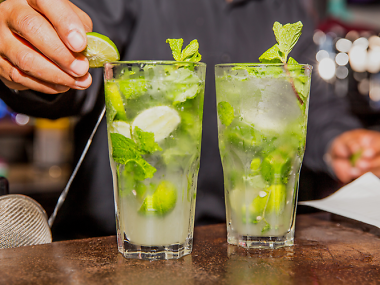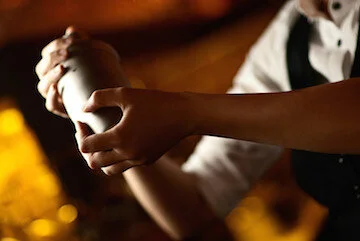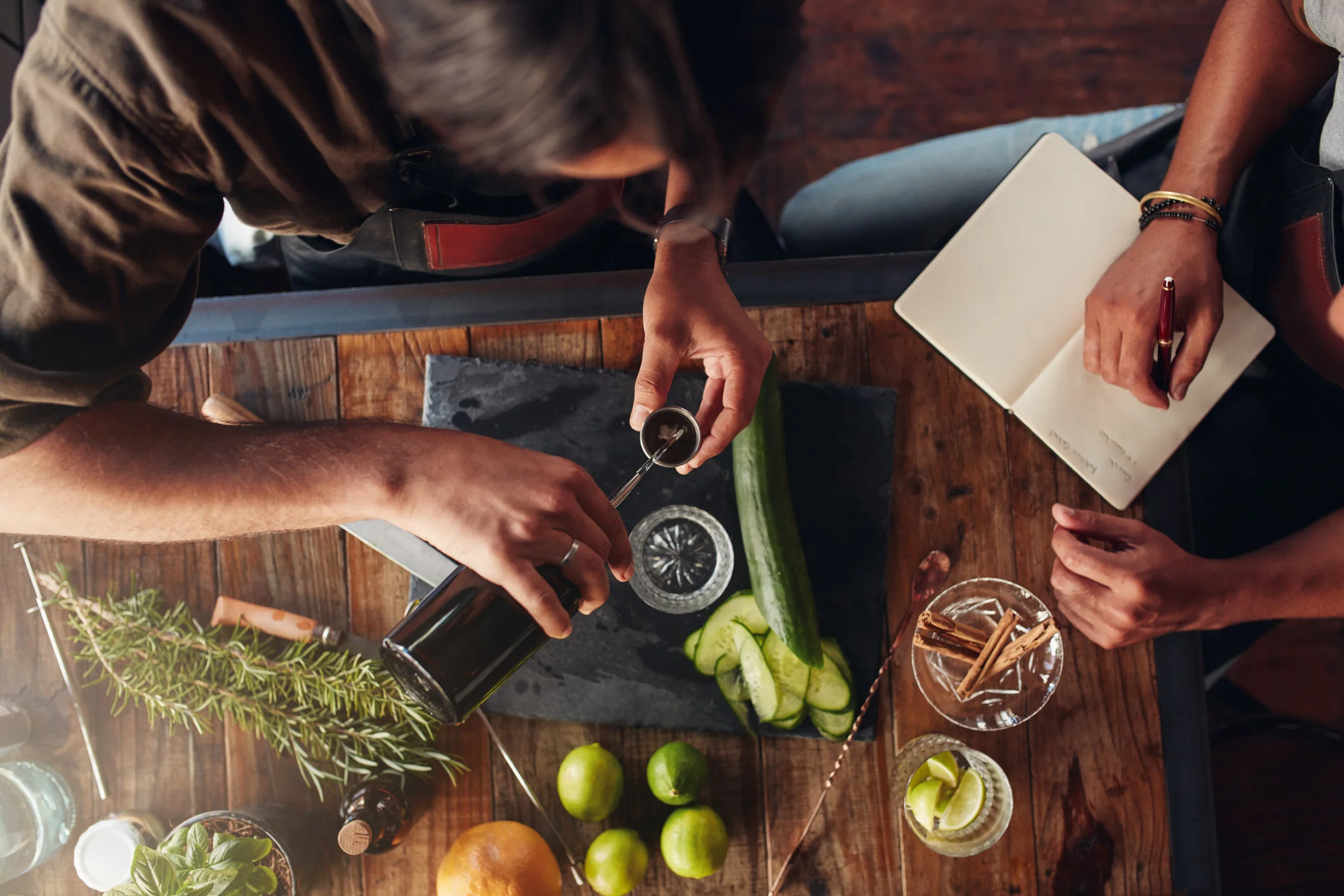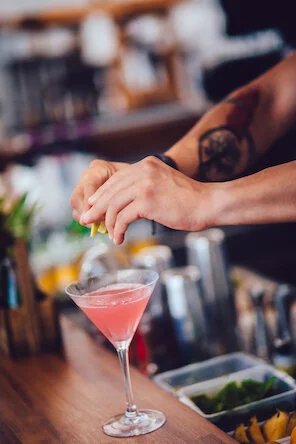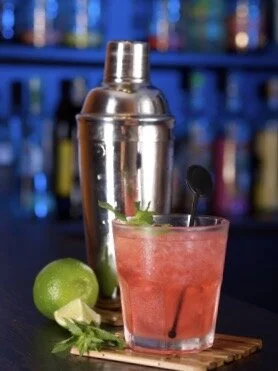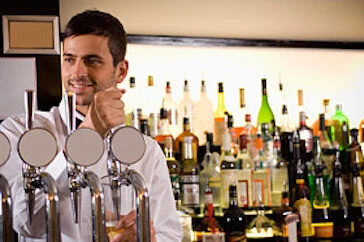Frequently Asked Questions
1. How much does the class cost and what does that include?
Our class (including everything) costs $259.00. This price includes a plastic wallet-sized "Bar Card" (Bartender Training Certificate) which shows the student’s info and that they have been fully trained in Professional Bartending and Mixology. The price also includes the ServSafe® Alcohol Safety Certification (required to work in several states) and the Student Manual, which is the student's to keep. All taxes, course material fees, and everything else are included as well.
The Bar Card is valid for life and accepted throughout the country as verification that a graduate has completed our program. The cost of the class may be earned back in a shift or two of bartending work so the course can serve as a very valuable investment that’s known to "pay for itself" several times over.
2. Do I need to be 21 to bartend?
No, the legal age to bartend is 18 in all of the states where we teach our in-person classes. In most states 18 is the legal age to serve alcohol, but if you're intending to pursue work in other states then we suggest to check the local laws to ensure that you meet the age requirements. Other states that we do not teach in range from ages 18 to 21 to bartend, so if you’re unsure about a certain state then you can give us a call or send us a message and we’ll happily tell you the age requirements for the location that you’re interested in.
3. How long is the class and are there breaks?
The class is 12 hours long and it is taught during two sessions (along with our alcohol safety training). We believe that 12 hours is the perfect amount of time to teach bartending and to give each student plenty of "hands-on" practice with mixing cocktails. We know how busy a person's schedule can be so our course is taught in two days to make it easy and convenient for students to attend. The class time is broken up into different sections with class activities, small breaks, and mixing sessions. We feel that less than 12 hours would not be a sufficient amount time to teach the course material and that any more than 12 hours is unnecessary. A lunch break is given toward the middle of each class and shorter breaks are held throughout the two sessions too.
4. Can I take the class in another state and still get the same Bartender Training and Alcohol Safety Certification?
Yes. Both the "Bar Card" (Bartender Training Certificate) and the ServSafe® Alcohol Safety Certification are standard throughout all of our locations so they appear and work the same regardless of where the class is taken. The only exception is that in some areas there are state-specific alcohol safety programs (such as the VT DLC course in Vermont and the RAMP course in Pennsylvania). When that is the case we also offer the state-specific alcohol safety program that is required there so that students are able to legally bartend in the state where they take the class. ServSafe® is valid in the vast majority of states throughout the country, but wherever there is a state-specific alcohol safety program we offer that to students so they will be covered. Regardless of where someone takes the class, we always train our students with the same bartending course material and teach our students whichever alcohol safety program is needed to legally bartend in the area where they will work.
5. What should I bring to class?
All of the course materials (including the Student Manual) are provided by the school so the only thing that we ask students to bring to our in-person mixing sessions is a pen or a pencil - and of course the ambition to learn a fun new skill!
6. If a class is being held at a university campus do I need to be a student at that college in order to attend this bartending class?
No. Our classes are open for all to attend and we often see people from the local area come to learn. There is no requirement to be a student of a college where a class is held in order to attend. There is also no requirement to be a resident of the state where the class is being held either. Our classes are open to everyone and we encourage anyone who is interested in bartending to join.
7. Are you a registered organization and do you meet all state regulation requirements?
Yes. A Twist Bartending School is a fully registered educational facility and meets all necessary regulatory and licensing requirements that apply to our program. We take every effort to ensure that our program adheres to the highest standard of quality possible and remains completely compliant with all applicable federal, state, and local requirements.
8. Do I need to have bartending experience to take this class?
No bartending experience is necessary to take our class. We encourage beginners to enroll in the class and the course is open for all to attend. Most of the people who take our program have no prior bartending experience at all. The instructor starts off with the basics and then moves onto more advanced areas of study so that everybody understands the material from the beginning.
9. Can I miss part of the class and make it up in the future?
Yes, our instructors are usually able to meet students before or after a class and during breaks to help them make up some time they have missed. It is also possible for students to make up part of a missed class during a future class or at a different location as well (and sometimes by watching a recorded video if the part of the class missed was held online). There is no extra charge to do something like this. If you would like to take the course but cannot attend a portion of it, then please let us know and we will accommodate the situation. We try our best to make every effort necessary to help students with such issues, and in most cases we can find a good solution for making up some missed class material.
10. Do I get practice with mixing cocktails?
Yes, each student gets plenty of "hands-on" experience with mixing the many cocktails we teach about in class. Students are able to get behind our "mixing stations" (which are set up like real-life working bars) and use bartending tools such as jiggers, muddlers, bar spoons, shakers, and all of the rest to assist them with making just about any cocktail imaginable. They also use the necessary mixers, garnishes, and other ingredients needed to create drinks like a salted Margarita “on the rocks”, a Long Island Iced Tea, and a Perfect Manhattan that’s “straight up and with a twist”.
During the mixing sessions students take turns being bartenders, "bar-backs", and customers to accomplish a real-life bar setting. We also use "A Twist Bartending Bucks" to act as our in-class currency. Throughout the class we do several exercises, activities, and even a couple of fun games to help students learn things such as proper pouring techniques, speed, style, and cocktail presentation. Students experience mock situations that they should expect to encounter once they start working as professional bartenders.
11. What else will I learn?
We teach about each and every aspect of the bartending job so that our students have an excellent understanding of the entire profession and are able to earn as much as possible while working. We teach about essential subjects such as building cocktails correctly and using efficient mixology techniques, learning cocktail recipes, setting up and taking down the bar, how to use bartending tools, spirit and liqueur info, beer and wine knowledge, and customer service. We also go over many other important areas such as cash management, up-selling, layering drinks, cocktail presentation, how different types of bars are managed, how to get a bartending job, how to deal with many unexpected situations, and just about everything else that’s necessary to start working as a proficient and professional bartender.
12. Is the class fun?
Yes! We strive to provide the most complete and informative bartending education possible, yet we do so with making sure that the class is a fun and enjoyable experience for everyone who is taking part. Students participate in class activities (and even some fun games) to help them become engaged and let the course lessons sink in. The material itself is interesting to learn about, the instructor’s real-life stories can sometimes be humorous, and the mixing sessions add a lot of interactive "hands-on" variety to the program. All of these things help the class to be a great learning experience as well as an enjoyable event for all who attend.
13. Do I get a certificate?
Yes. After completing the course each student receives our "Bar Card" (Bartender Training Certificate) which states that he or she has graduated from the program and has fully completed training in bartending and professional mixology. Each student also becomes certified in the National Restaurant Association's ServSafe® Alcohol Safety Program (which is required to work in several states) so they are ready to legally begin bartending after finishing the class. The Bar Card is valid for life and may be used anywhere as verification of training. The ServSafe® certification is valid for 3 years (and after that it may be renewed with our school for a small fee). Our graduates may also sit in on any of our future classes for free if they wish to refresh their memory with the material or further enhance their bartending skills.
14. Can I bartend anywhere with the certificate?
Yes. The "Bar Card" (Bartender Training Certificate) may be used as verification of training in every state throughout the country. The ServSafe® Alcohol Safety Certification (and the other state-specific alcohol safety programs that we teach) legally cover students for alcohol safety training requirements wherever the student takes the class. ServSafe® is accepted as valid alcohol safety training in most states, but some places have their own specific programs. In Vermont we teach the VT DLC Program and in Pennsylvania we teach RAMP. Everywhere else that we teach our class the ServSafe® Program is accepted. If you plan to bartend in a state that we do not teach in then give us a call and we’ll check on the state requirements to make sure that they accept ServSafe®. The ServSafe® Program is accepted in most states so it covers our students throughout the vast majority of the country.
Our graduates have worked all over the United States and in several foreign countries as well. One of the best parts about bartending is that once somebody is properly educated how to do it, they can use their skills anywhere so long as they speak the language and meet the local requirements. Students can also choose to bartend and at any point of time in their future, which makes it a very valuable skill to learn and possess.
15. How much could I expect to earn while bartending?
Bartending is an excellent paying job. According to the Bureau of Labor Statistics, bartenders can usually expect to earn between $175 to $350+ per shift in the areas that we teach (sometimes it can be significantly more in places like big cities and high-end cocktail establishments). Some of our instructors have worked in venues where experienced bartenders consistently earn between $350 to $600 per shift, and in certain high-end places bartenders can sometimes earn over $1,000 in a single night. How much bartenders earn can vary greatly based on factors such as their bar's location and which shifts are being worked, but in our experience most bartending jobs pay very well. In some cases, people who bartend as a second part-time job can actually earn more money bartending than they make with their full-time career job. Bartending is a unique occupation which stands among the few jobs that offer the ability to earn a lot of money in a short period of time, while doing so with a relatively small learning investment (even during a recession). The cost of the class is usually earned back in a shift or two of bartending work, and it leaves someone with a valuable skill that can earn them a substantial sum of money each time they use it.
16. Do you offer private group lessons?
Yes, we do! If your organization is interested in hiring an instructor to train a large group then please let us know and we can give you more details. We are often able to accommodate many types of unique situations and put together a program that works well for the group of people who need to be trained.
17. How can you help me get a job?
Our instructors are well aware of what employers look for in potential employees. During the class we teach about how to get a bartending job. After completing the course the student receives two certificates. They receive our "Bar Card" (Bartender Training Certificate) for Professional Bartending and Mixology along with the ServSafe® Alcohol Safety Certification. If an employer requests, we can also issue them a letter of recommendation that illustrates what the student has learned and highlights his or her skills and qualifications.
Bars contact us to request information about graduates when positions become available at their establishments. We also inform our students when we track a job opening that's in an area which they are interested in working. In class, students are given the opportunity to be placed in our job placement database so that if we find matching bars that are hiring (or if a bar in the student’s area inquires about graduates) then we can tell the bar who may be available to work. Some bars prefer recent graduates who have little or no bartending experience because these people have learned proper techniques and have not developed any poor habits. We try our best to give our students the best bartending education possible so that they are able to get a great paying bartending job once they graduate. Bars are constantly hiring for available positions in most well-populated areas (even when the economy is in a recession), which usually makes bartending an easily obtainable job for a properly trained bartender who is seeking employment.
18. Do you offer gift certificates?
Yes, we do! Giving someone the gift of learning how to professionally bartend can be “a gift that keeps on giving”! If you are interested in purchasing a gift certificate then please contact us by email or phone. We can issue a gift certificate for any upcoming class, as well as for future classes that have not been scheduled yet. Gift certificates are valid and don’t expire for three years from their purchase date, and they may be used for any future class within that timeframe in any location where we teach.
"Whether a graduate wants to work part time by their college, get a summer job near the beach or wander half way around the world to tend bar, they can do it with training from A Twist Bartending School."- Andrew L. (Instructor)
Note: Classes may fill at any time so it is advised that students register as soon as possible.


